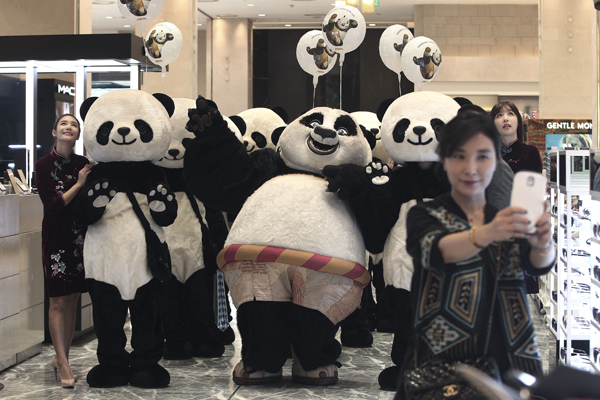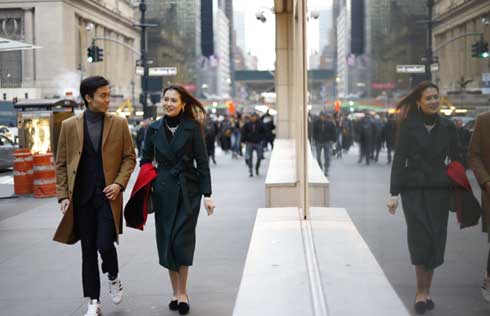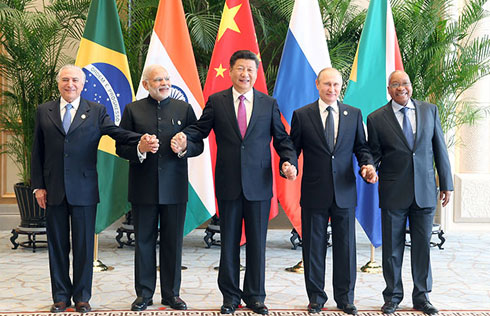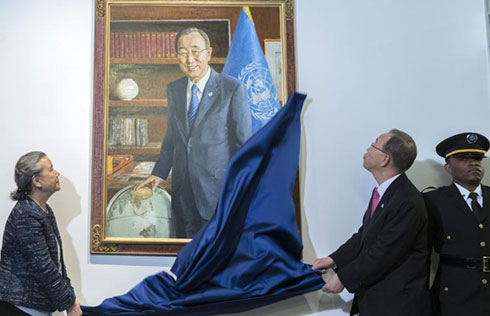New visa aims to lure affluent Chinese to S. Korea
 |
|
A woman takes a selfie with workers wearing panda costumes during a promotional event for Chinese tourists at a department store in Seoul, South Korea, in April. [Photo/Agencies] |
South Korea will introduce a new five-year renewable visa in January to attract affluent Chinese tourists, against the backdrop of a decrease in Chinese arrivals in the second half of the year.
The visa, which allows holders to return for stays of up to 30 days during the period of validation, is named hallyu, after the Korean pop culture wave. Chinese tourists who buy specialized four-day travel packages costing 17,350 yuan ($2,500) or more can apply.
China's leading tour company, Ctrip, predicted that only 1 percent of mainland tourists would be eligible for the new visa.
South Korea rapidly became a top destination among Chinese travelers in recent years, though it saw a brief slowdown in May last year after an outbreak of Middle East respiratory syndrome. By the end of this year, the number of Chinese visitors is expected to reach a record 8 million, an increase of 33 percent year-on-year.
However, since Seoul announced in July that it would deploy the THAAD advanced United States missile defense system, there have been monthly decreases in the number of Chinese tourists. According to Seoul, 917,500 Chinese visited South Korea in July, but only 680,900 visited in October and 516,956 in November.
Xu Xiaolei, a spokesman for China Youth Travel Service Co, said his company saw a decrease of about 20 to 30 percent in the number of visitors to South Korea in the second half of the year compared with the first half. He said "many complicated exterior reasons" were responsible.
Additionally, protests arising from a scandal that led to the impeachment of South Korea's president affected some Chinese tourists' decision-making.
Tao Jia, a fashion buyer in Wuxi, Jiangsu province, rebooked her trip to Tokyo instead of Seoul in late November because she was concerned that protests in the South Korean capital might disrupt her travel or otherwise prove inconvenient.
Industry insiders said it was too early to know whether the new visa might fuel South Korea's inbound tourism industry in the coming year.
Wang Zhenyue, deputy director of UTour International Travel Service's direct-marketing center, said the timing of the new visa policy is good because it coincides with the New Year and Spring Festival holidays, a peak season for outbound Chinese tourism.
However, the amount needed to qualify for a hallyu visa "is relatively expensive" for a brief visit, and "residents from Shanghai and Beijing can easily get a five-year, multiple-entry visa without spending so much money", he said.
Xu of China Youth Travel Service said the new visa might prove more attractive to those from certain second- and third-tier cities whose residents usually must provide more documents to get a regular visa.
"However, generally speaking, the visa threshold for South Korea is not high," he added.
- Yin Chengji visits South Korea and Japan
- Eggs in short supply as South Korea battles worst bird flu outbreak
- Ant Financial makes inroads in South Korea
- Rural Land Consolidation in Japan, South Korea and Taiwan: Main Practices and Policy Implications
- South Korea's Park asks parliament to find way for her to step down
- Popular tourist destinations in Gyeonggi-do, South Korea


























